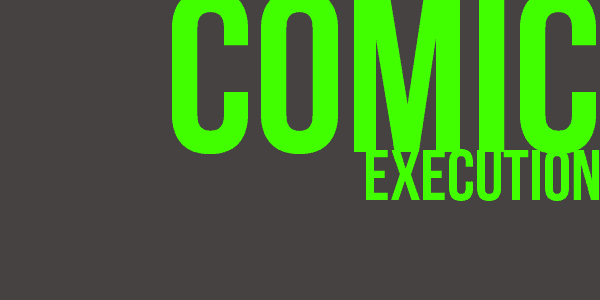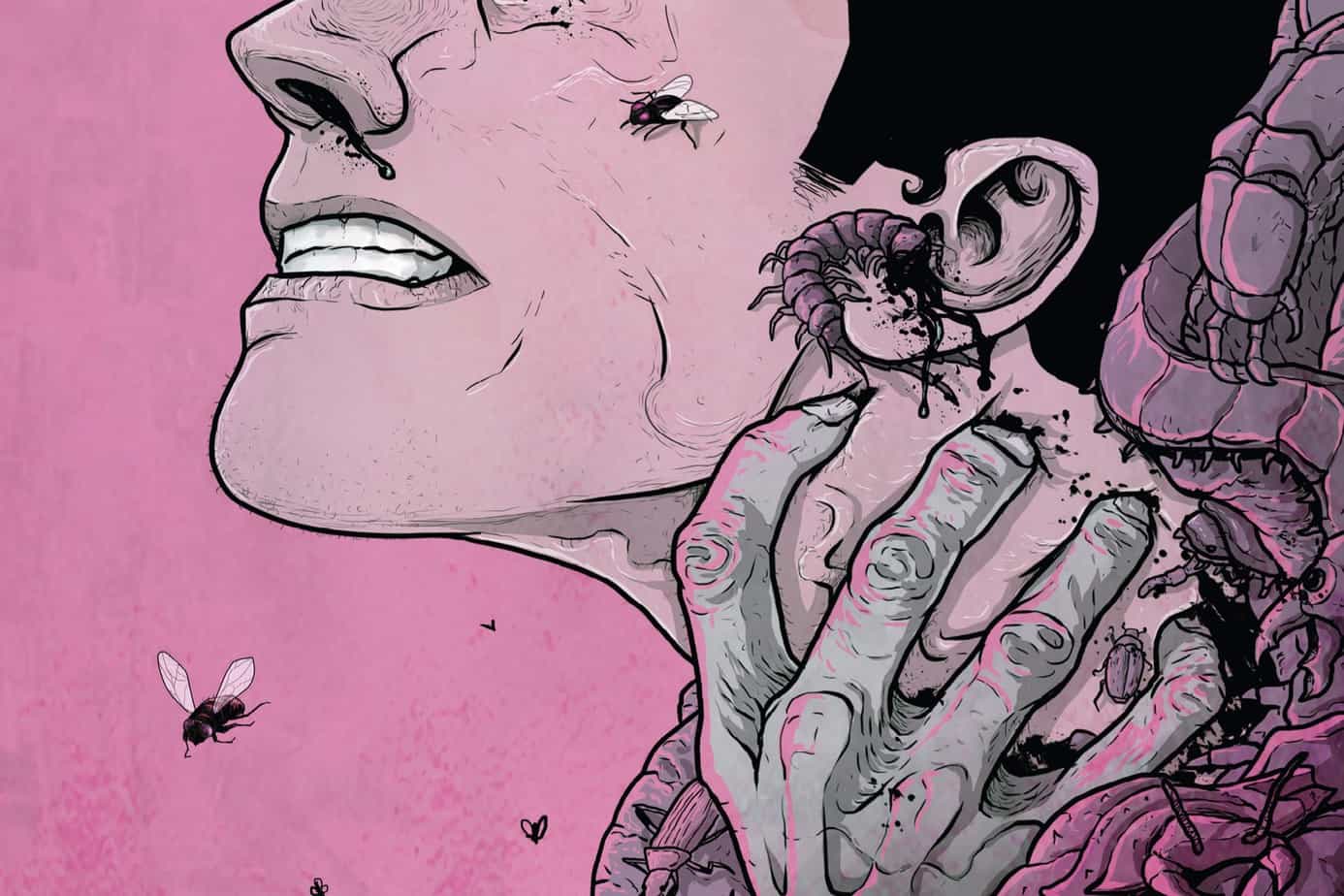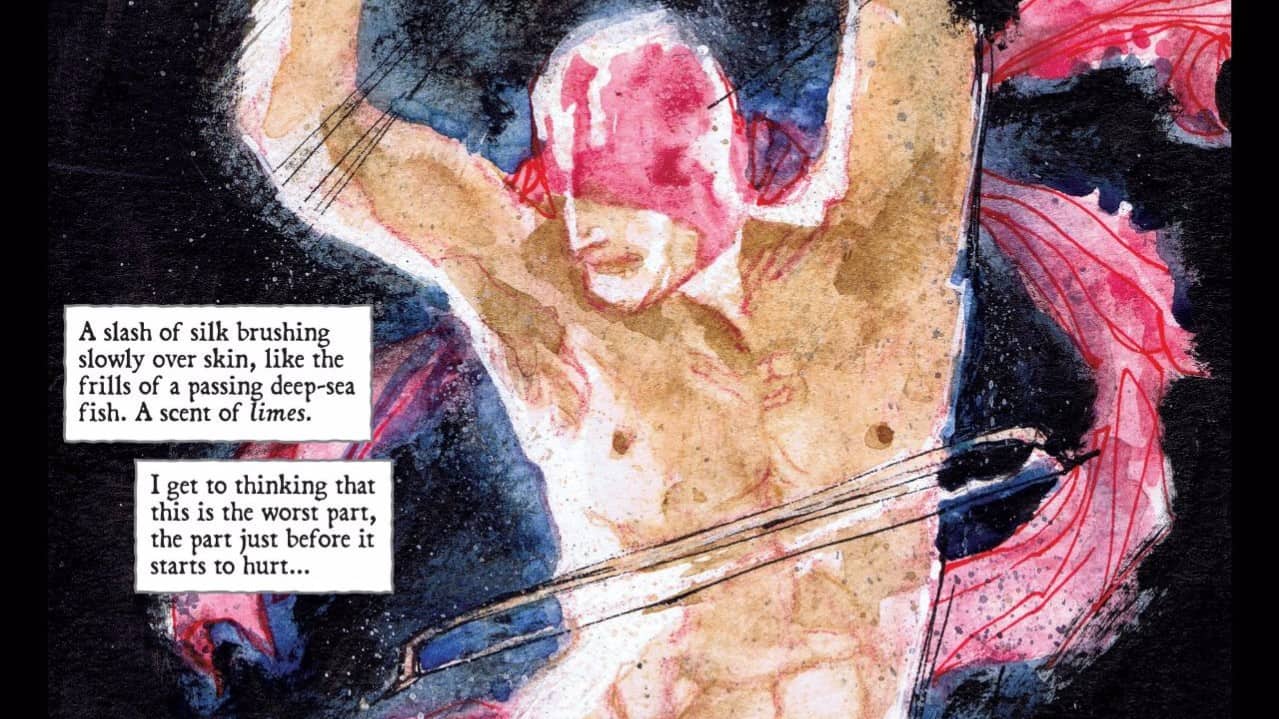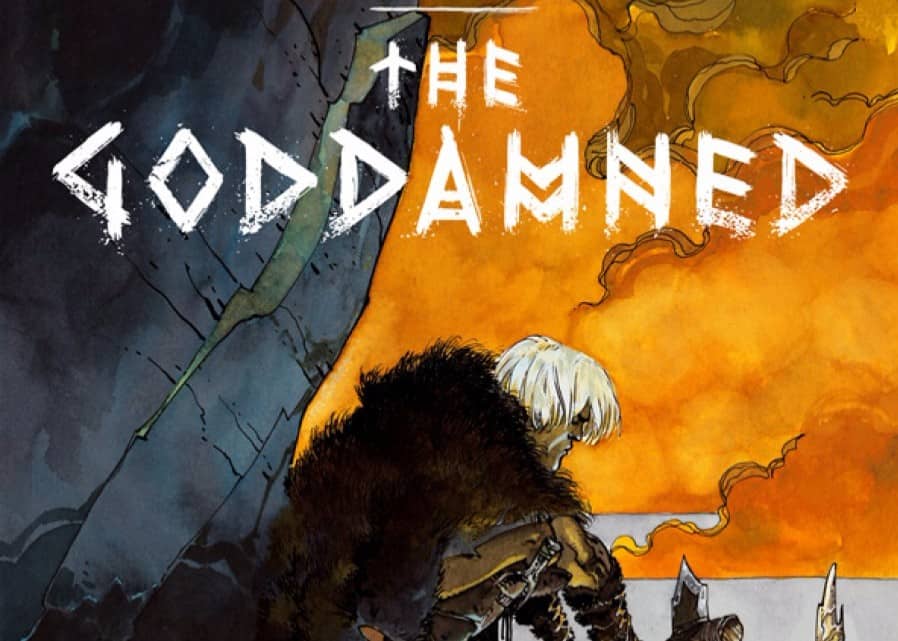
[Comic Execution] 2/14 – ‘THE FUSE’, ‘THE MERCENARY SEA’, ‘CITY: MIND IN THE MACHINE’
Science fiction, man. I love it. But comic books make me want to hate it. I mean, I get that comic books aren’t really a literary medium. They can be, but they’re read mostly by people avoiding the commitment and sometimes challenge of a more rigorous, if still speculative, format, namely prose. Now I’m not going to pretend that prose SF&F is always a step up from comics and, in fact, there’s pretty much an equal ratio of turds to gold (there’s some kind of law for this, I think). But so much more effort is put into the “science” part of science fiction in literature than it is in comics, and that seems to be an unfortunate result of the assumption (perhaps correctly) most comic book writers make that their audience isn’t interested in “harder” sci-fi or fantasy. But they try at it anyway sometimes, trying to create something that looks legitimately “genre” but failing by merit of backing off of the more esoteric depths of deeper SF&F lit. They’re writing SF&F-lite, and it’s a bit aggravating how prolific that has become when a series like ‘The Massive’ presents exactly what authors like William Gibson or Arthur C Clarke would have done with the same material.
Basically, what I’m saying is: go buy the first trade of ‘The Massive.’ It’s coming to an end soon and you’ll want to be there for what I expect will be a humdinger of a climax for a series that’s as literary as “action” comic books can get.
 THE MERCENARY SEA #1
THE MERCENARY SEA #1
Writer: Kel Symons
Artist: Matthew Reynolds
Publisher: Image Comics
Price: $3
It really is scary how much stuff Image puts out on a regular basis. I knew that they were going to be my main supplier when I started this gig but I figured they’d be sharing the space with at least a couple other publishers. Apparently I forgot how determined they are to introduce as many new stories to the comic book world as possible. No complaints here, it’s a nice back-up when I’m yet again out of continuing series to review. Thus, this review of THE MERCENARY SEA, a comic I’d glimpsed ads for in the back of some Image books but never had a particular interest in.
And rightly so: THE MERCENARY SEA is, on the surface, a pretty unremarkable proposition. It’s a pulpy, WWII-set adventure comic akin to ‘Five Ghosts’ or ‘Ghosted’ without the ghosts. Or anything supernatural, really. In setting and scope, it shares more with ‘The Massive,’ a highly underrated favorite of mine also about a ragtag band of nomadic sailors searching the high seas for something they’re not even sure exists while dealing with various antagonists along the way. If I had known it was a cross of the low-brow thrills of ‘Five Ghosts’ with the sea-borne grandeur of ‘The Massive’, I would’ve been sold on it sight unseen.
But instead I read through it my first time not knowing what to expect, other than a tweet from the author insisting I review this AND the other Image debut this week. His plea did provoke me to read THE MERCENARY SEA, so there’s that. As I tracked through the first few pages, I thought he had connived me into reading a comic so pulp I could taste the cheap vodka. But then author Kel Symons utterly smashed my skepticism by putting my favorite comedy of all time in the comic: ‘Duck Soup’. So it’s a slightly skewed, winking homage to pulp I’m in for, much like ‘Ghosted.’
Throughout the comic, Symons somehow embraces the cheesy, unironic, macho pandering of adventure pulp yet imbues the material with just enough wit and sophistication to elevate it above that sincerest form of flattery. All of the characters fit into certain tropes but not irritatingly so, usually displaying a bit more of the positive elements of their cliches, especially in their interactions with each other. Despite being an issue mostly full of exposition, there’s plenty enough action and character development. I’ve never read Kel Symons, even though his previous Image series, ‘I Love Trouble’, was well-received if little read, and now I’m feeling like I need to rectify this immediately, as his laid back, Whedon-lite approach to dialogue belies his dextrous, precise approach to spinning a yarn. And while I’m loathe to admit it, I’ve been so heavily immersed in “high concept” SF&F comics as of late that THE MERCENARY SEA’s retro, raffish tale is a breath of fresh air.
The art, courtesy (both lines and colors) of Matthew Reynolds, is both unorthodox and appropriate. His lines often disappear in favor of a highly stylized, color-saturated aesthetic that serves the story surprisingly well, consider how light its tone is. And where other artists who have to simplify their lines to convey the action in smaller panels can suffer for that, Reynolds opts to communicate in detailed silhouettes that still convey a surprising amount of visual information despite being mostly featureless. In fact, when he DOES opt to accessorize these silhouettes with notable details, it results in a much appreciated directness well suited to THE MERCENARY SEA’s brash narrative. It doesn’t hurt that he drops layers onto layers onto more layers, conveying depth and texture with a savvy that indicates his mastery of his particular illustrative method.
But the real key to Reynolds’ accessibility here is his exaggerated and risky coloring. Many panels are entirely monochromatic. There’s a generous variation of shades in these panels but if not for Reynolds’ deft choice in palette, the general sameness of these panels would incur the wrath of readers bored by such tedious imagery. He graces these panels with not just thoughtful hues but sometimes punctuates them with contrasts, often utilizing subtle but clever iconography to make characters and locales pop. There’s details abound that don’t immediately distract the reader from the narrative itself but Reynolds’ passion is obvious with a single reexamination of the contents of THE MERCENARY SEA.
I’m definitely in love with this comic. It might be that I’m a sucker for nautical tales (ie ‘The Massive’ & ‘Great Pacific’) and it’s also likely that THE MERCENARY SEA was accidentally blessed with being a welcome respite from the onslaught of weightier comic book stories. Or it could be that it’s just a great comic with an inauspicious unpretentiousness. Regardless, at $3 for nearly 30 pages, they could drop seven pages and still have my money. Let’s hope that doesn’t happen though.
CITY: THE MIND IN THE MACHINE #1
Writer: Eric Garcia
Artist: Javier Fernandez
Publisher: Darby Pop/IDW
Price: $4
This comic is brought to you by the Darby Pop! imprint of IDW Comics. What the hell does Darby Pop mean? Only company founder & TV vet Jeff Kline knows. That’s ‘Extreme Ghostbusters’ (don’t look it up) Jeff Kline, whose most recent creation, ‘Transformers: Rescue Bots’, took the more successful (yet canceled) ‘Transformers: Prime’ (of which he was a producer) and reworked it for younger audiences. Because older kids don’t buy as many action figures.
The newest series from the Darby Pop! (I am going to be so fucking sick of that exclamation point by the end of this review) is CITY: MIND IN THE MACHINE. This naming convention, while cute, is not a good first impression. It says “We really wanted to just call it ‘City’ but that was taken so we decided to tack on ‘Mind In The Machine’ even though that would work just fine as a title by itself.” I’m just going to call it CITY:MIND. That one’s a freebie.
CITY:MIND is written by Eric Garcia. Eric Garcia wrote the book that the film ‘Matchstick Men’ was based on. He’s also responsible for ‘Anonymous Rex’, one of the most hilariously bad TV shows in the history of bad TV shows. He didn’t even just write that one, he was an executive producer. Garcia was also responsible for the novel upon which the film ‘Repo Men’ was based. Don’t even get me started on the ‘Repo Men’ vs ‘REPO!’ controversy. But let me say this; if you had this novel that no one would option or produce until, all of the sudden, a big name studio snatches up the rights in a hurry and throws it into production in a matter of a few months, wouldn’t you be suspicious? Especially given that, at almost the exact same time, a smaller studio is filming a very similar piece that is based off a long-running, successful stage play? Wouldn’t that give you pause? Wouldn’t you come to the conclusion that maybe, just MAYBE, your producers are trying to capitalize on the growing, grassroots, word-of-mouth popularity of the other movie?
Especially given that one of the producers is the loathsome Scott Stuber.
So what do I make of Eric Garcia’s CITY:MIND? It’s just as bad as I’d hoped it would be. We’re introduced to Ben, a character so bland I hesitate to call him a protagonist, because that word contains the root word “agōnistēs” which means “actor” in Greek, implying that he “acts” when, in fact, Ben does almost nothing throughout this issue. Actually, he’s pretty well DEFINED by his inability to act; as a programmer, his anti-terrorism surveillance program hilariously misfires and drops a SWAT team on a pack of kids playing cops-and-robbers. His only response; “I’ll dig into the code.” Then he apparently fails to pick up on a co-worker’s attempts at flirting, despite being her efforts being painted so overtly I can only assume she got advice from a hooker. It reaches a point where I just stopped caring about the character because of how solidly boring he was. “I’m just trying to save the city, Rajni. One line of code at a time.” *snooze*
But then hey, one well-timed terrorist attack later and all Ben’s problems are solved! He’s got all-seeing cyborg eyes! Somehow he’s STILL the most passive, pathetic character one could ever hope for in a comic book. His boss jerks him around by his implants and he just mopes about his fate. His awesome, awesome fate. It’s the “I Never Asked For This” syndrome and it pisses me off endlessly every time I see it and it’s played totally straight here, as though we’re supposed to sympathize with someone who we’ve been asked to pity since page eight.
It’s a shame the art is as good as it is. It’s wasted on this. There’s actually quite a few interesting panels, visually; particularly the action scenes at the beginning and the terrorist attack. If I could stomach the annoyingly stupid script, it might be worth another few issues just to see what else the art team does.
But I’m done talking about this book. It’s lame, rote, there’s nothing interesting about it, it feels like a blatant grab at the wave of realistic sci-fi shows (especially ‘Persons of Interest’ which this clearly is trying to latch on to) and I won’t give it any more attention than it deserves. And neither should you.
 THE FUSE #1
THE FUSE #1
Writer: Antony Johnston
Artist: Justin Greenwood
Colors: Shari Chankhamma
Publisher: Image Comics
Price: $3
It’s the future! Oops, was that an exclamation point? Let’s try that again.
It’s the future.
We all know there’s nothing to look forward to in the future, at least not in terms of radical advances in cool things happening to humanity. Smartphones? Sure, they’ve essentially become our second brain but what little excitement they once held was quickly throttled ‘til it croaked by the endless commercialization and ruthless exploitation that always happens when this kind of thing occurs. If science fiction writers should have learned anything by now, it’s that the future should look an awful lot like the present, complete with those obnoxious little details that render the idea of “wonder” into abstraction.
THE FUSE is damn good at doing just this. There’s a giant orbital platform that houses cities of people, most of whom are running away from Earth because the truth about life in space is that it’s suboptimal compared to terrestrial habitation. So naturally, this orbital habitat called “the Fuse” is often a shitty place to live and, more importantly, die. Writer Antony Johnston spends most of the first issue of his book elaborating on this from the perspectives of both weary law enforcement vet Klem and accomplished but naive new arrival Dietrich also a police officer. Klem’s an older Russian woman and Dietrich a younger, black German, respectively. They’re apparently part of a more diverse future world, as further illustrated by the colorful assortment of characters populating the world of THE FUSE.
And here’s my first problem with THE FUSE: it’s a grim, unpleasant future full of the kind of cynicism-inducing vagaries that make day-to-day life such a grind in real life. Yet, for some reason, the racial segregation that plagues even the most progressive of modern metropolitan areas has evaporated, as far as I can tell. Maybe there’s a reason for this? It’s possible. Yet if you choose to explain away racial tensions & segregation with one sci-fi novelty, it seems contradictory to use excuses like “the city won’t buy more security cameras” elsewhere when any number of futuristic solutions could be implemented.
The buddy cop charm of THE FUSE grates on my nerves more than a bit, having recently executed the similarly “gritty” ‘Bloodhound’ comic for its procedural tedium having been enforced by contrived, heavily telegraphed plot twists, all iced over by a layer of gaudy police drama cliches. THE FUSE already sinks into those well-worn routines with aplomb, making Klem uninteresting simply by merit of giving her nothing in her personality to distinguish her from any other macho officer of the law besides her gender and race. There’s perfunctory moments where those come into play but are quickly flushed away by the central mystery introduced in the first issue.
Except it’s really hard to care about that mystery when we know so very, very little about the nature of THE FUSE itself. We don’t know what level of technology people have access to or how much modification there is in terms of physiology and the like. How do we even know these are real corpses popping up to make our protagonists lives more interesting? THE FUSE is obviously playing a longer game than this but it wants us to instead care about the characters, rather than the setting or the plot. Klem being Russian has nothing to do with her brash rudeness so it feels more like the result of Johnston engaging the “police drama trope” engine by having a foil to the muted, observant, “outsider” Dietrich. I just don’t care about these characters, and since the plot has no real traction yet and the setting doesn’t make much sense, I find myself struggling to find anything likeable about THE FUSE.
Justin Greenwood’s art is good stuff. The lines are expressive, impressionistic and he handles a large amount of stuff on every page with a concrete sense of control while still retaining a certain style of friendly looseness. He conveys grittiness well and he absolutely has to be applauded for managing such a wide range of character diversity without flubbing anything, near as I can tell. He doesn’t have any obvious weaknesses when it comes to locales, establishing shots, technology, etc. But I also can’t summon anything particularly outstanding about the visuals, either. Many of the backgrounds are just blank placeholders and the ones that are rendered are usually bland. I mean, I get that The Fuse isn’t a particularly exciting setting to look at, but all we really see are very standard looking industrial backdrops and…
I’m beating a dead horse here. THE FUSE does nothing for me, writing or art-wise. Which is strange, because Antony Johnston’s work on ‘Umbral’ is absolutely thrilling, a page-turning, grin-inducing wild ride. But this story feels so lifeless, so derivative… I think it’s maybe just because this is supposed to be a sci-fi tale, yet there’s absolutely nothing exciting about the future of THE FUSE. It’s utterly mundane. And that’s a huge disappointment, one I won’t ask my readers to suffer for themselves.



